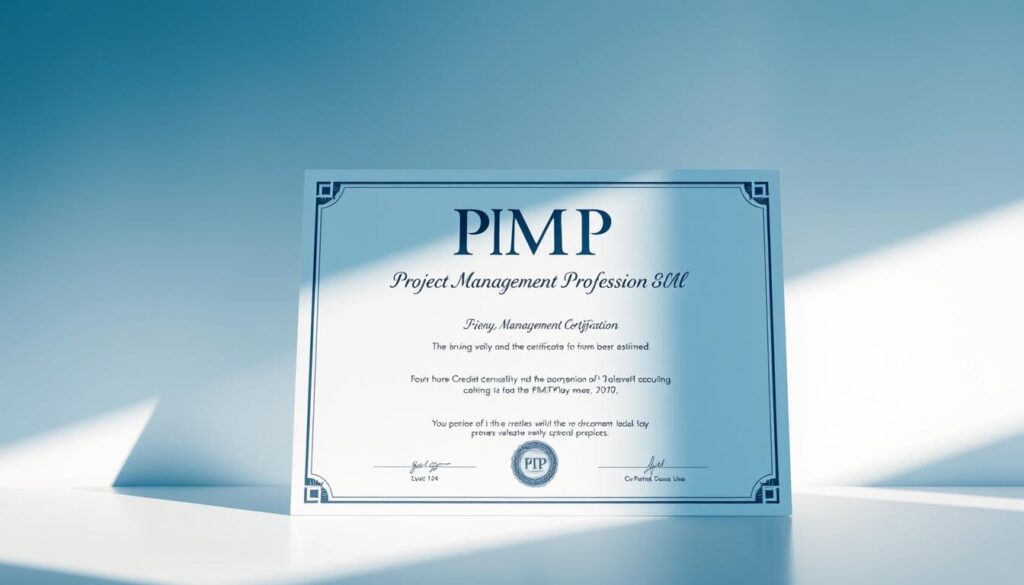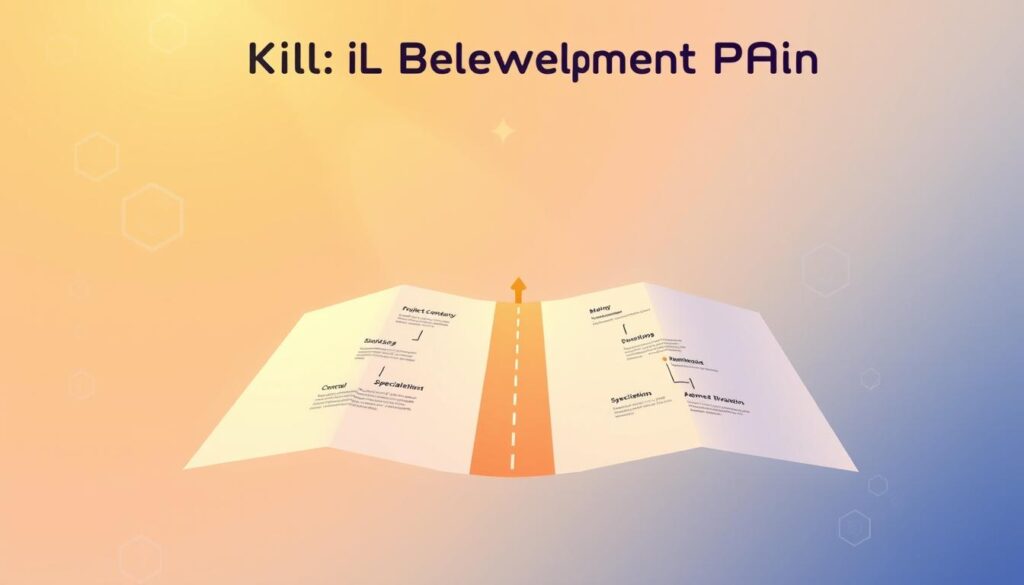To achieve a six-figure salary as a professional in the field, it’s essential to possess high-demand skills that are currently in short supply. The job market is competitive, but with the right skills, you can stand out and command a higher salary.
According to the Bureau of Labor Statistics, certain roles related to project manager careers are expected to grow significantly through 2030. This growth indicates a rising demand for skilled professionals who can manage and execute projects efficiently.
Key Takeaways
- Possessing high-demand skills is crucial for a six-figure salary.
- The job market for project management roles is competitive.
- Certain project management roles are expected to grow significantly through 2030.
- Having the right skills can help you stand out in the job market.
- Skilled professionals can command higher salaries.
The Current Landscape of Project Management Careers
As businesses continue to navigate complex projects, the demand for skilled project managers has never been higher. The field is experiencing significant growth, driven by the need for professionals who can manage projects efficiently and effectively.
Growth Trends in Project Management
The project management landscape is witnessing a substantial shift, with various factors contributing to its growth. Some of the key trends include:
- Increased adoption of project management methodologies
- Rising demand for digital transformation projects
- Growing need for agile project management skills
Industry Demand Statistics
According to recent statistics, the demand for project managers is on the rise. Organizations across various industries are seeking professionals with the skills to manage complex projects and deliver results. You can explore industry-specific job openings to understand the current demand better.
Projected Job Growth Through 2030
The Bureau of Labor Statistics suggests that employment of project managers is projected to grow 6% through 2030. This growth is driven by the need for organizations to manage complex projects and deliver results. To succeed in this field, you need to stay up-to-date with the latest trends and skills.
To capitalize on this growth, it’s essential to develop high-demand skills and stay informed about industry trends. By doing so, you can position yourself for success in the project management field and potentially earn six-figure salaries.
Technical Project Management Skills in High Demand
To excel in project management, you need to possess a range of technical skills that are currently in high demand. One of the most critical aspects of technical project management is understanding various project management methodologies.
Project Management Methodologies
Project management methodologies provide a framework for managing projects effectively. You should be familiar with different methodologies to choose the best approach for your project.
Mastering Agile Frameworks
Agile methodologies are becoming increasingly popular, with 70% of organizations adopting Agile practices, according to a survey by Gartner. Mastering Agile frameworks can help you manage complex projects and deliver results quickly.
Traditional Waterfall Management
While Agile is gaining popularity, traditional Waterfall management is still widely used. Understanding the strengths and weaknesses of Waterfall can help you decide when to apply this methodology.
Implementing Hybrid Approaches
Many organizations are now adopting hybrid approaches that combine elements of Agile and Waterfall. Being able to implement hybrid approaches can make you more versatile and valuable as a project manager.
Here’s a comparison of the three methodologies:
| Methodology | Key Characteristics | Best Used For |
|---|---|---|
| Agile | Iterative, flexible, collaborative | Complex, dynamic projects |
| Waterfall | Linear, sequential, predictable | Well-defined, low-risk projects |
| Hybrid | Combines Agile and Waterfall elements | Projects that require flexibility and predictability |
By mastering these technical project management skills, you can increase your value to your organization and stay competitive in the job market.
Essential Leadership Skills for Top-Earning Project Managers
To achieve six-figure salaries, project managers must possess strong leadership skills that enable them to manage and motivate their teams effectively. Leadership skills are critical in driving team performance and achieving project goals.
Team Management and Motivation Techniques
Effective team management involves a range of skills, including communication, delegation, and conflict resolution. According to a survey by Gallup, organizations with high-performing teams are 21% more profitable. To build such teams, project managers must understand how to motivate their team members, foster a positive work environment, and lead by example.
Building High-Performance Teams
Building high-performance teams requires a strategic approach. This includes identifying the strengths and weaknesses of team members, providing targeted training and development opportunities, and promoting a culture of collaboration and innovation. By doing so, project managers can unlock the full potential of their teams.
Remote Team Leadership
With the rise of remote work, project managers must also develop skills in remote team leadership. This involves leveraging digital communication tools, setting clear expectations, and fostering a sense of connection among team members who may be geographically dispersed. Effective remote leadership is about trust, flexibility, and results-oriented management.
By mastering these leadership skills, project managers can significantly enhance their earning potential and career prospects. Developing strong leadership skills is an ongoing process that requires dedication, practice, and a willingness to adapt to changing project demands.
Industry-Specific Knowledge That Boosts Your Value
In the rapidly evolving tech landscape, having the right industry-specific knowledge can significantly enhance your project management career. As technology continues to advance, the demand for skilled project managers who understand the intricacies of tech projects is on the rise.
Technology and IT Project Management
Project managers in the tech industry need to be well-versed in specific areas to manage complex projects effectively. Two critical areas of focus are the software development lifecycle and cloud infrastructure projects.
Software Development Lifecycle
Understanding the software development lifecycle (SDLC) is crucial for managing software projects. This includes knowing the different phases, from planning and design to testing and deployment. Familiarity with SDLC methodologies such as Agile and Waterfall can help you navigate project complexities.
Cloud Infrastructure Projects
As more businesses move to the cloud, knowledge of cloud infrastructure projects is becoming increasingly valuable. This includes understanding cloud service models (IaaS, PaaS, SaaS) and managing cloud migration projects.
| Skill | Importance in Tech Industry | Relevance to SDLC |
|---|---|---|
| Agile Methodology | High | Directly applicable |
| Cloud Migration | High | Indirectly applicable |
| Project Planning | Medium | Directly applicable |
According to a report by Gartner, the global IT project management market is expected to grow 10% annually through 2025. This growth underscores the importance of having industry-specific knowledge in technology project management.

Project Manager Careers: Specializations That Command Higher Salaries
As a project manager, you’re likely aware that specializing in a particular area can significantly boost your earning potential. Certain specializations can lead to six-figure salaries, making them highly desirable for career advancement.
Program Management
One such lucrative specialization is program management. According to a survey by PMI, program managers can earn up to 20% more than project managers. Program management involves overseeing multiple related projects and aligning them with strategic business objectives.
Multi-Project Coordination
A key aspect of program management is multi-project coordination. This involves managing resources, prioritizing tasks, and ensuring that multiple projects are executed efficiently. Your ability to coordinate multiple projects effectively can significantly impact the overall success of the program.
Strategic Alignment Techniques
Another critical skill for program managers is strategic alignment techniques. This involves ensuring that the projects under the program align with the organization’s overall strategic objectives. By doing so, you can maximize the value delivered to the organization and enhance your career prospects. For more insights on high-paying management jobs, you can visit Nexford’s insights page.
By focusing on program management and developing skills in multi-project coordination and strategic alignment, you can position yourself for higher salary potential and greater career success.
Must-Have Certifications for Six-Figure Project Managers
To achieve a six-figure salary as a project manager, having the right certifications is crucial. Certifications not only demonstrate your expertise but also significantly enhance your career prospects and salary potential.

PMP (Project Management Professional)
The PMP (Project Management Professional) certification is one of the most prestigious certifications in the project management field. It is recognized globally and demonstrates that you have the knowledge, skills, and experience to manage projects effectively.
Preparation Strategies
Preparing for the PMP certification exam requires a strategic approach. You should start by ensuring you meet the eligibility criteria set by the Project Management Institute (PMI). Then, focus on studying the PMBOK Guide and other relevant materials. Enrolling in a preparation course or joining a study group can also be beneficial.
ROI of PMP Certification
According to a survey by PMI, PMP-certified project managers can earn up to 25% more than non-certified project managers. This significant increase in salary makes the investment in PMP certification a worthwhile one. The ROI is not just financial; it also includes enhanced credibility and career advancement opportunities.
By obtaining the PMP certification, you demonstrate your commitment to the profession and your ability to manage projects efficiently. This can lead to better job opportunities and higher salaries, bringing you closer to your goal of a six-figure salary.
Developing Business Acumen for Strategic Project Leadership
Developing business acumen is a key step towards achieving six-figure salaries in project management. To succeed in strategic project leadership, you need to understand how your projects impact the organization’s financial performance and overall strategy.
Financial Management and Budgeting
Strong financial management skills are essential for project managers. This includes budget creation and defense, as well as financial performance tracking. According to a survey by CFO, organizations with strong financial management practices are 25% more likely to achieve their strategic objectives.
Budget Creation and Defense
Creating a comprehensive budget involves estimating costs, allocating resources, and establishing financial benchmarks. Defending your budget requires presenting a solid business case, anticipating questions, and demonstrating the value of your project.
Financial Performance Tracking
Tracking financial performance involves monitoring expenses, identifying variances, and taking corrective action. This ensures that your project stays within budget and delivers the expected return on investment.
| Financial Management Aspect | Importance | Best Practice |
|---|---|---|
| Budget Creation | High | Detailed cost estimation |
| Budget Defense | High | Presenting a solid business case |
| Financial Performance Tracking | High | Regular monitoring and variance analysis |
By developing your business acumen and financial management skills, you can drive strategic project success and increase your earning potential.
Building a High-Value Project Management Skill Set
To achieve a six-figure salary as a project manager, it’s crucial to develop a high-value skill set. This involves a combination of technical, business, and leadership skills that are in high demand across various industries.
Creating Your Skill Development Plan
Creating a skill development plan is the first step towards enhancing your project management skills. According to a survey by Gartner, organizations that invest in skill development are 30% more likely to achieve their strategic objectives.
Skill Gap Analysis Methods
Conducting a skill gap analysis is essential to identify areas that need improvement. This can be done through self-assessment, feedback from peers and supervisors, or using skill assessment tools. Identifying your skill gaps allows you to focus on areas that will have the most significant impact on your career.
Prioritizing Development Areas
Once you’ve identified your skill gaps, it’s crucial to prioritize development areas based on their relevance to your career goals and the current job market. Prioritization ensures that you’re focusing on skills that will enhance your value as a project manager.
Here’s an example of how to structure your skill development plan:
| Skill Area | Current Level | Desired Level | Development Action |
|---|---|---|---|
| Project Management Methodologies | Intermediate | Advanced | Take a certification course |
| Leadership Skills | Basic | Intermediate | Attend a leadership workshop |
| Financial Management | Intermediate | Advanced | Enroll in a financial management course |
As emphasized by industry experts, “Investing in skill development is not just about personal growth; it’s a strategic move that can significantly impact your career trajectory and earning potential.”
“The way to get started is to quit talking and begin doing.”

Networking and Personal Branding for Career Advancement
Advancing to a six-figure salary in project management requires more than just technical skills; it demands a strong network and personal brand. As you strive for career advancement, understanding the importance of networking and personal branding is crucial.
Building a Professional Network
A strong professional network can open doors to new opportunities, provide valuable insights, and support your career growth. According to a survey by LinkedIn, professionals with a strong network are 27% more likely to achieve their career goals.
Industry Association Involvement
Joining industry associations can be a powerful way to expand your network. These organizations often provide access to exclusive events, training opportunities, and like-minded professionals. For instance, the Project Management Institute (PMI) offers various membership benefits, including networking events and professional development resources.
Relationship Cultivation Strategies
Cultivating relationships within your network requires effort and strategy. Regularly engaging with your contacts through social media, attending industry events, and offering help when needed can strengthen your professional bonds.
| Networking Strategy | Benefits | Actions |
|---|---|---|
| Industry Association Involvement | Access to events, training, and professionals | Join PMI, attend local chapters |
| Relationship Cultivation | Stronger professional bonds, new opportunities | Engage on social media, attend events |
By focusing on building a robust professional network and a compelling personal brand, you can significantly enhance your career prospects and move closer to achieving a six-figure salary.
Negotiating Your Way to a Six-Figure Project Management Salary
Achieving a six-figure salary in project management requires more than just technical skills; it demands savvy negotiation. To successfully negotiate your salary, you need to be well-prepared with data-driven insights.
Researching Market Rates
Understanding the current market rates for project managers is crucial. This involves gathering data from various sources to determine the average salary range for your position.
Salary Data Sources
Some reliable sources for salary data include:
- Glassdoor
- Payscale
- LinkedIn Salary
- Industry-specific reports
According to a survey by Glassdoor, professionals who negotiate their salary are 15% more likely to achieve their desired salary. This statistic underscores the importance of being informed and prepared.
Understanding Total Compensation
It’s not just about the base salary; total compensation includes other benefits like bonuses, stock options, and additional perks. Understanding these components can help you negotiate a more comprehensive package.
Total compensation is a critical aspect to consider during salary negotiations. It encompasses not only your salary but also other financial benefits that can significantly impact your overall remuneration.
By researching market rates and understanding total compensation, you can confidently negotiate your way to a six-figure project management salary.
Conclusion: Your Roadmap to a Six-Figure Project Management Career
To achieve a six-figure project management career, you need to develop a range of skills, including technical, business, and leadership skills. By following the roadmap outlined in this article, you can acquire the high-demand skills needed to succeed in this field.
As a project manager, you are on a journey of continuous learning, constantly evolving with new tools, techniques, and challenges. Equipping yourself with the latest knowledge of project management standards and best practices is essential for a successful career.
By focusing on developing your technical, business, and leadership skills, you can create a strong foundation for a six-figure project management career. This roadmap will guide you in making informed decisions about your career development and help you stay on track to achieving your goals.